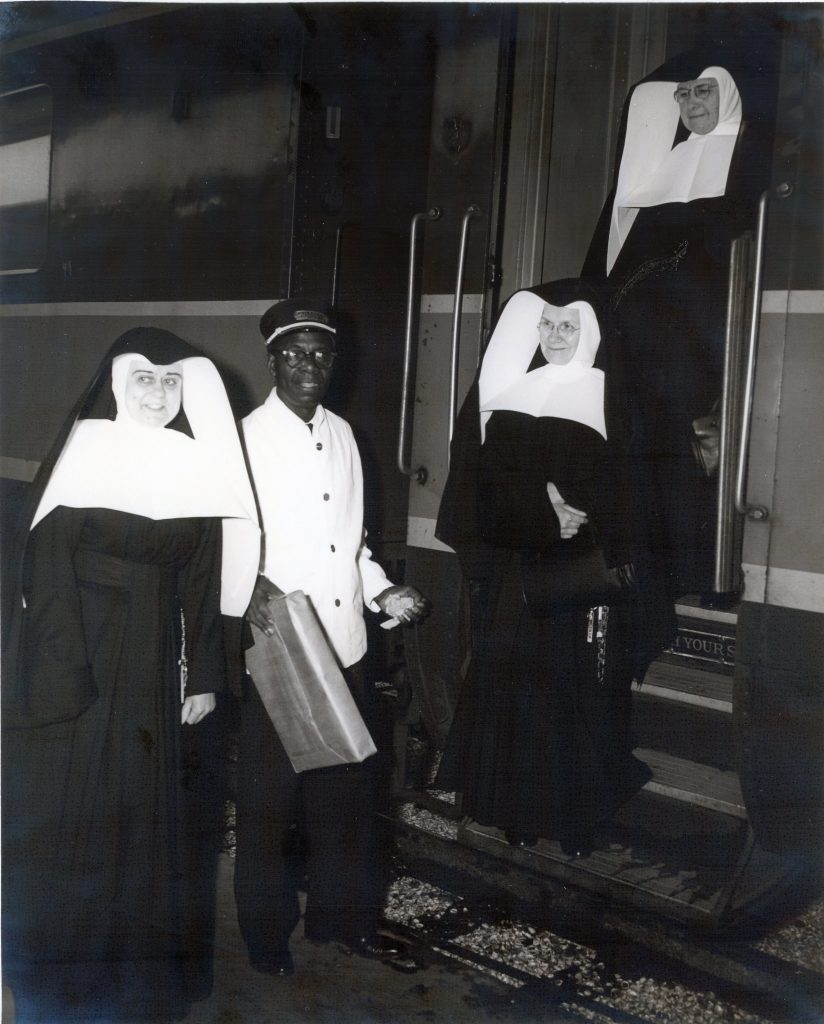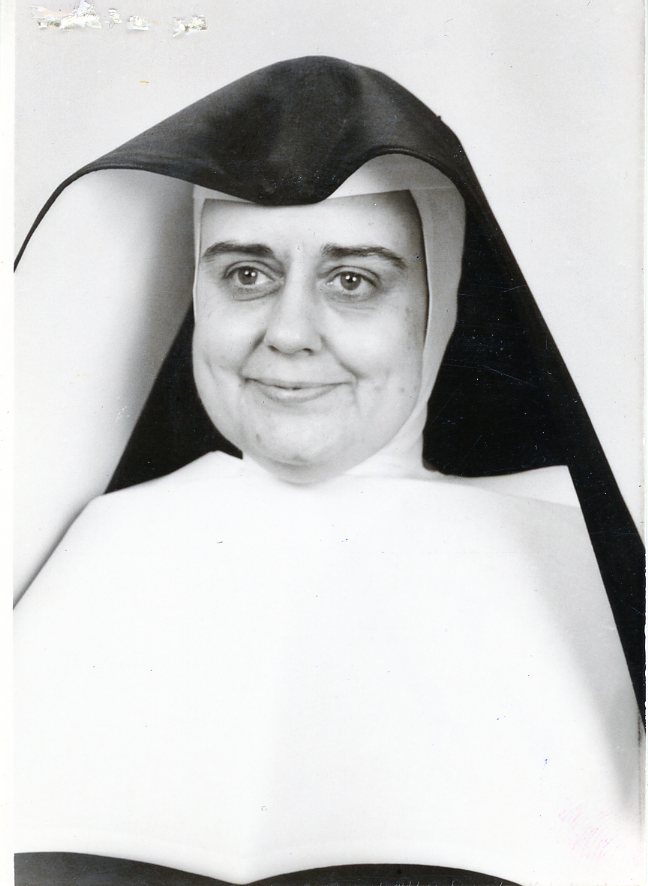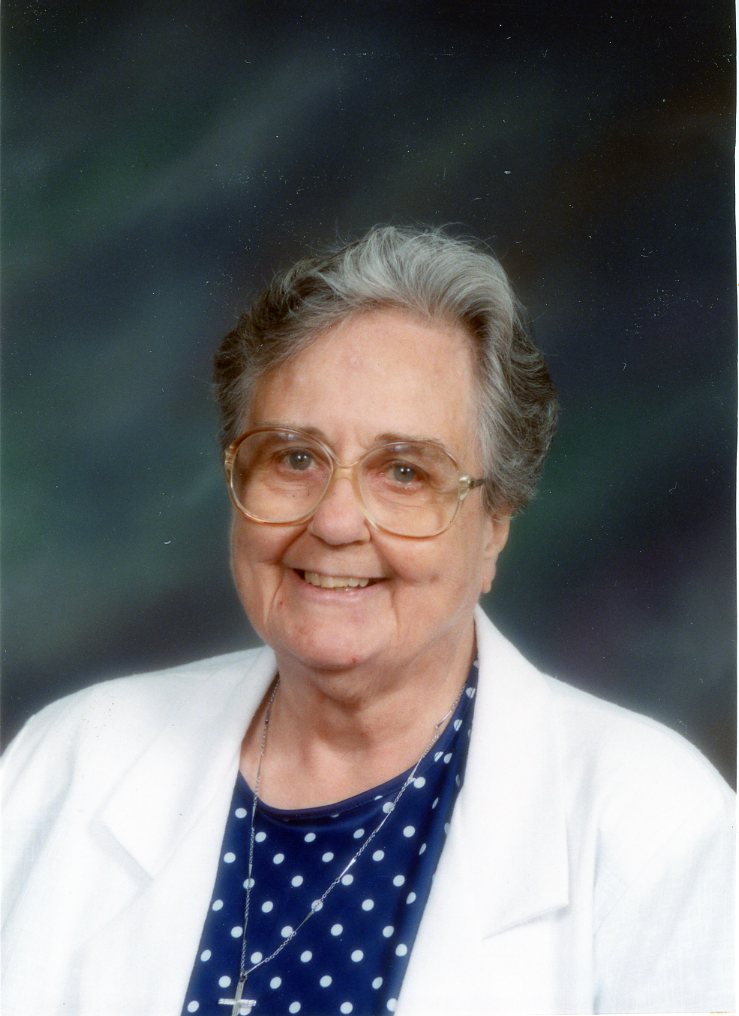By: Michele Levandoski
Dorothy Lillian Hensgen was born on November 18, 1914, in St. Louis, Missouri, the oldest of Jules and Louise Hensgen’s three children. According to her autobiography, “three times before the age of four, she lay at death’s door.” The third instance occurred in 1918 at the height of the influenza pandemic when Dorothy and her father contracted the flu. Her father had a mild case, but Dorothy was seriously ill with double pneumonia. Her mother spent three days and nights praying for their recovery. Little Dorothy recovered and the strength of character and tenacity needed to survive such a serious illness would serve as a cornerstone of her life to come.
Dorothy attended St. Ann’s School before enrolling at Rosati-Kain High School in St. Louis. She knew she wanted to be a sister educator, so after graduating she entered the School Sisters of Notre Dame (SSND). In 1934, she entered the novitiate and received the name Sister Mary Caroleen. She professed her vows the following year.

Mothers Theodosia Bettels (second from right) and Hilaria Coleman (far right) greeted by Sister Caroleen Hensgen as they arrived in New Orleans for the Centennial celebration. The photo is dated December 1956.
She began her teaching career in elementary and junior high schools in Illinois and Missouri. In 1944, she earned a master’s degree in Latin and English and was sent to teach at Rosati-Kain High School. In 1949, she was appointed as the principal of Notre Dame High School in St. Louis, which began an 18-year career as a high school administrator at schools in Missouri, Illinois, Iowa and Louisiana.
In 1956, Sister Caroleen was appointed principal of Redemptorist High School in New Orleans. Initially she dreaded the assignment because she was afraid of the large water roaches that were everywhere, but she later said that her time in New Orleans were the best years of her life. Redemptorist High School was in an impoverished neighborhood and most of her students lived in poverty. Sister Caroleen said of her work there, “We worked hard to end the failure in their lives, to teach them they could succeed. We addressed the individual needs of each student and tried to motivate every one. It was the most challenging and demanding job I’ve ever had.” When she left, she had more than doubled the number of young men who enrolled in college.
In 1962, she became the principal of Redemptorist High School in Baton Rouge. Her five years at Redemptorists were filled with activity. In addition to being principal, she was the part-time supervisor of elementary schools, served on various boards and advisory committees, was one of 40 administrators from across the United States selected to attend special training at New York University and in 1966, she was named the director for the Head Start program in Baton Rouge. It was in the midst of all this work that she received the appointment that would change her life and the face of Catholic education in the United States.
“National Notoriety and Acclaim”
In 1967, Sister Caroleen achieved “national notoriety and acclaim” when she was appointed as the superintendent of Catholic schools for the Diocese of Dallas-Fort Worth[1], making her the first woman superintendent of a diocesan school system. She would be responsible for the diocese’s 66 elementary and 13 high schools. Sister Caroleen later said of the appointment, “I did realize I was the first woman superintendent, but that wasn’t considered an honor. But as time went on, I began to realize that if I didn’t do a good job or become so aggressive that I was a terrible threat, that I would destroy other people’s opportunities.”
Being a “first” is often difficult but being the first woman in this position in the Catholic Church in the 1960s was especially challenging. To say her appointment was not well received by her fellow superintendents is an understatement. At her first national meeting of Catholic superintendents, she was mistakenly assigned to a room with a monsignor. She walked into the room, saw his shaving cream and slippers, and got out of there as fast as she could. She immediately went to the reception desk to clear up the mistake, which meant she made a grand entrance into the banquet hall. “It took everything I had to walk into the banquet hall. The first round table I came to, they saw me coming and they turned the chairs up. The second one I went to said they were sorry, but I couldn’t sit there because they were holding them [the seats]. I just sat down quickly at the third table.”
At the diocese, Sister Caroleen experienced no barriers, but at meetings with other superintendents she was shunned. Other than a perfunctory, “Good morning,” no one spoke to her. “For two years I was the only woman amid 250 Roman collars. It seemed like forever.” It took about four or five years for the ice to melt. At meeting after meeting, she would square her shoulders and make the best of it. She ate alone and kept her opinions to herself during sessions.
It took time, but she finally found her voice. At a meeting in St. Petersburg, Florida, the men were discussing the issue of women religious asking for contracts to teach at parochial schools. The general opinion was that contracts for teaching sisters was a problem and that sisters “should just serve.” Sister Caroleen thought, “They’re talking about me,” so she stood up and said, “If you don’t start looking at the ways religious are examining their own lives today, we’re just going to walk away from you and leave you in the dust and do our own thing. You’re dragging your heels!” According to Sister Caroleen, “They almost died” at her response.
In 2011, the archivist for the Diocese of Dallas was quoted as saying, “At first they didn’t know how to handle her. They never learned because she learned how to handle them. They came to realize what a gift she was to the diocese.”
Despite this chilly reception she forged ahead by modernizing and innovating the Dallas-Fort Worth Catholic school system. One of the first things she did was replace the 15 members of the clergy on the school board with lay people and closed nine elementary schools. In 1968, she introduced a program called Redesigning Education to Articulate Change (REACH), which was a method of studying basic subjects through drama, art and music.
“Havens for Segregationists”
In 1971, a suit was pending in federal court against the Dallas Independent School District (DISD) alleging that the school district failed to comply with federal desegregation requirements. As a result, white parents started looking to enroll their children in private and parochial schools to avoid having to attend desegregated schools.
An undated newspaper article found in Sister Caroleen’s records described the situation that occurred as the result of the court case. Principals at private schools were reporting that parents were “virtually beating on their doors, begging for admission for their children.” One principal reported that a man even offered to build a new auditorium for the school if it accepted his grandchildren.
Sister Caroleen and the diocesan school board knew they needed to address this issue. On July 8, 1971, the board voted unanimously to freeze registration at Catholic schools. Under the board’s action, only students who fit the following criteria could register at a Catholic school: had been registered at the school the previous year; transferred from one Catholic school to another; or moved from out-of-town. The only exceptions were for children enrolling in the lowest grades at a particular school (e.g. kindergarten for elementary schools and ninth grade for high schools).
The decision made national news. Sister Caroleen was quoted in several articles explaining the decision, saying, they would “not let our schools become havens for segregationists.”
The decision was controversial and did not come without consequences. At the time of the enrollment freeze many Catholic schools nationwide were struggling with decreased enrollment and untenable financial situations. Priests and sisters were leaving teaching at a steady rate and were being replaced with lay teachers, whose salaries were three to four times higher than religious salaries. In addition, the DISD case came on the heels of a Supreme Court ruling that temporarily stopped parochial schools from receiving state and federal funding. The board understood that they would increase their income by accepting new students, however, “We chose to take this stand because money cannot take the place of principle.”
This period was the most difficult point of Sister Caroleen’s career. The freeze lasted eight years and was financially costly and drew widespread criticism. Not only did she face hostile Catholic parents, but pastors who were upset at the loss of enrollment and money. According to an article published in 1971, diocesan school officials estimated that the freeze would cost Catholic schools in Dallas County $300,000 in lost tuition over the course of a year. Enrollment at these same schools decreased by about 250 students each year. The freeze officially ended in April 1978, and it was not until the 1981-1982 school year that schools began to see enrollments increase. Despite these issues, only one parish school in Dallas County closed during the freeze.
“I Served the Church Well”
Despite the enrollment freeze, Sister Caroleen continued to do her job ensuring that children enrolled in Catholic schools in the Diocese of Dallas received a good education. However, her work in Dallas was often informed by her previous work in Louisiana on assisting children in need.
In September 1979, a United States district judge denied the children of undocumented immigrants access to DISD schools. Sister Caroleen was alerted to the fact that there was a large community of undocumented immigrants in Dallas and she, along with assistance from other religious faiths, responded to the problem with “Proyecto” (the “Project”).
The idea was to set up schools for Spanish-speaking children to ensure their education was not interrupted by this ruling. The Dallas Jewish community provided funding, several Protestant churches provided space and Sister Caroleen and the diocesan education office accepted the responsibility for the project. In January 1980, four accredited schools opened for the children of undocumented immigrants. The judgement was reversed a few months later and the schools closed that summer.
Sister Caroleen later said, “I am proud that our schools have kept pace with the ethnicity of the city and I don’t care who knows that we are helping the undocumented aliens get a decent education.”
Sister Caroleen retired from the Diocese of Dallas in 1991. When asked how she felt about retiring, she said, “I don’t have any regrets; I feel I served the church well. I gave what I had, and if I can no longer give it to the extent that I did, then I think it’s time to hang it up.” She spent her retirement working on her family history and writing the history of Catholic education in North Texas. She moved to St. Mary of the Pines in Chatawa, Mississippi shortly before her death in 2013 at the age of 98.
In her obituary, a colleague superintendent is quoted as telling Sister Caroleen, “Your name has become synonymous with quality Catholic education throughout the United States…Without your willingness to be the front runner, Catholic education would not be where it is today.”
[1] Fort Worth became its own diocese in 1969. Sister Caroleen continued to work as the superintendent of schools for the Diocese of Dallas after this split.
This article is part of the School Sisters of Notre Dame North American Archives’ 175th anniversary celebration of SSND arriving in North America. Since July 2022, the staff at the North American Archives has celebrated this milestone each month by highlighting a particular sister, event or mission that has a unique place in the congregation’s history in the United States and Canada. Read all of the 175th anniversary stories here.


